Inheriting money or property can cause a lot of resentment between family members. When somebody feels like they didn’t get what’s ‘owed’ to them, they might lash out. Of course, this isn’t fair. Some situations are so tense that you might even need to ask the law to step in to sort things out.
Redditor u/AccomplishedMango209 went viral after revealing how she was finally forced to evict her brother and his family from a house that she had inherited. Read on for the full story and to see how the internet reacted to everything.
Bored Panda was interested in learning about what every landlord should keep in mind before renting their property to family and friends, so we reached out to G. Brian Davis, real estate investor and co-founder of SparkRental.com. He shed some light on the topic. Scroll down for the insights he shared with us.
Unfortunately, inheriting something can sour some of your relationships with your family members

Image credits:pro_creator (not the actual photo)
One woman opened up on the internet about how renting her property to her brother backfired in a major way
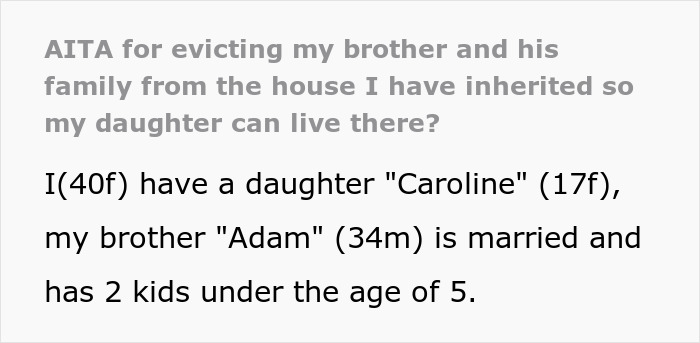


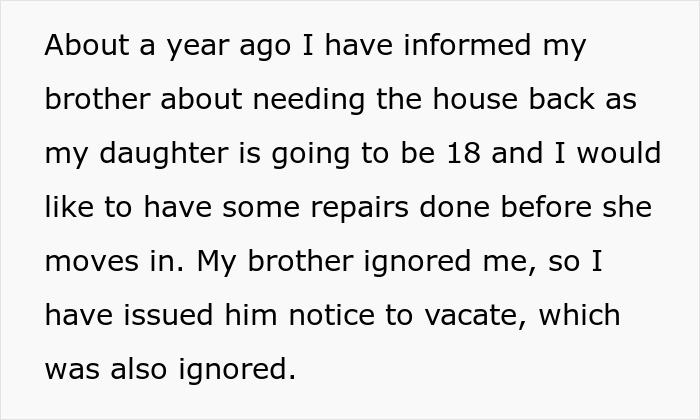

Image credits:Allan Vega (not the actual photo)
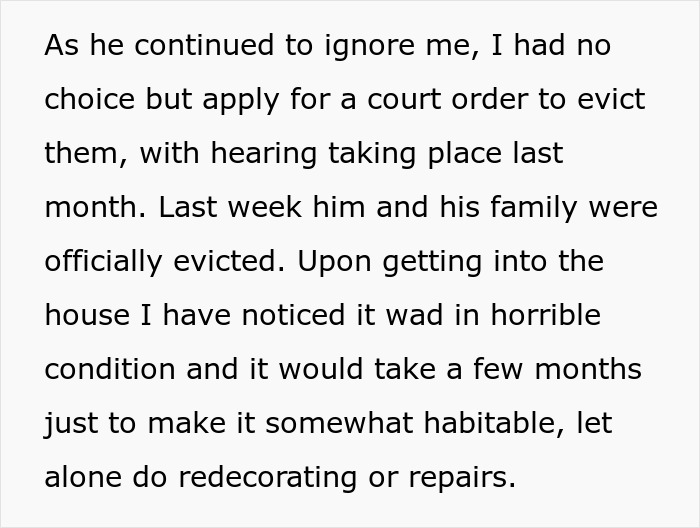
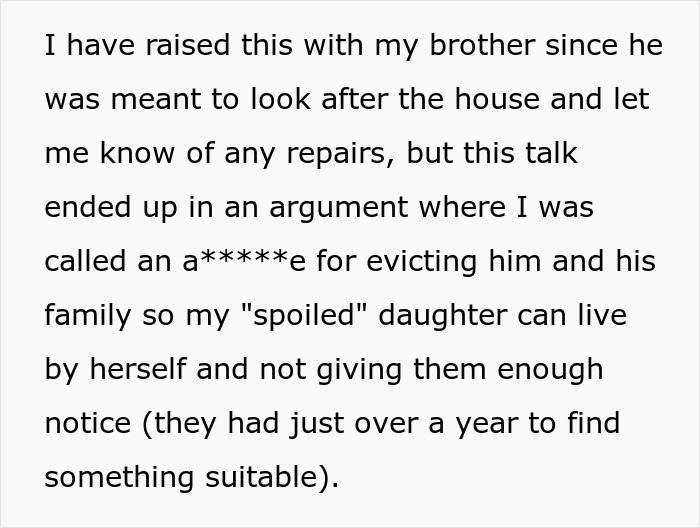

Image credits:AccomplishedMango209
Landlords need to view themselves as a business because being overly generous can backfire in the future
We asked Davis, the co-founder of SparkRental.com, what anyone planning on renting property to their nearest and dearest should keep in mind before they go through with it. “I’ve seen this happen many times, where a landlord tries to do something generous for a family member and it comes back to bite them,” he told Bored Panda in an email.
“Landlords need to always view themselves as a business: they provide housing as a service. The stakes are high because the assets are extremely expensive and valuable. It’s also a heavily regulated business, with many complex laws that often favor renters over landlords. This is all to say that landlords should view family members through the same lens that they look at any other prospective renter: What’s their income? Their creditworthiness? Are they likely to pay the rent on time? How well do they treat the homes where they’ve lived?” he shared some of the factors that all property owners should be considering.
After taking this honest look at one’s family member, the landlord might actually still decide to rent to them despite the red flags they may see. However, they should do so with open eyes, Davis said. The reality is that they may have to evict them in the future. Not only that, but this might also strain their personal relationship if things go sour.
Davis shared with us that landlords generally have two options when a renter refuses to move out. They can either evict them or offer them cash for keys.
“It sticks in your craw to pay a bad actor to do the thing they were supposed to do in the first place, but sometimes, it’s cheaper and faster than going through the often-lengthy eviction process,” the co-founder of SparkRental.com said.
From his perspective, novice landlords often let tenants “push them around.” Sometimes, this means that the property owners are persuaded not to start the eviction process at all.
“It’s a long process with many steps, so landlords should treat it like any other business process and start following the steps as soon as it’s triggered. The renter can stop the process at any time by curing the violation. But it starts with an official eviction warning notice, followed by a mandatory waiting period, then filing in court, then scheduling a hearing, attending it, and ultimately scheduling a put-out date. It usually takes 2-6 months in total, sometimes longer, depending on the jurisdiction.”
Davis also shared with us an infographic detailing the eviction process. You can view it right over here.

Image credits:Jason Leung (not the actual photo)
Evicting someone is never an easy choice. Often, it acts as a last resort
According to Law Depot, the grounds for legally evicting someone include lease violations (for example, not paying rent or damaging the property), wanting to sell the property, and the need for extensive renovations.
You can also evict someone if they refuse to leave after their lease expires or if they’re performing illegal activities on the property. Of course, evicting someone you know is a huge decision, which is why landlords typically consider other options first and leave it as a last-case response.
As we’ve covered previously, some people can feel like they’ve been left out if they’re living paycheck to paycheck and didn’t inherit anything while their relatives did.
What you do with your inheritance is, ultimately, up to you. If you feel like the wealth could use being spread around the family a bit more, that’s your choice. However, you shouldn’t feel like you have to do this if you want to keep everything for yourself. But you do have to consider the potential fallout.
However, when we’re talking about property, unless you decide to sell it, sharing everything becomes much more difficult. The author of the post found a friendly way to do this: she rented out the house to her brother and his family.
She was also very clear about the conditions under which she was renting the property out: her brother would have to move out once her daughter turned 18 so that she could move in. This sounds incredibly generous. Not to mention that she, the author, also gave her brother a year’s heads-up about having to move out.
Unfortunately, things didn’t turn out as planned. Not only did her brother try to stay at the house, but the property itself was also badly damaged.

Image credits:Allan Vega (not the actual photo)
Even if you fully trust your relatives, it’s still a good idea to have a tenancy agreement
While it can feel uncomfortable and awkward if you’re suspicious of what your family and friends might do to your house, the reality is that anything can happen. You might trust someone only for them to prove that they’re not worthy of that trust. Or someone might accidentally damage the property without meaning to.
Verbal rental agreements will only muddy the waters. Go for signed documents. You can be friendly, loving, and caring while also looking out for your own best interests.
It’s recommended that you write up an official contract whether you’re renting your property out to a complete stranger or someone you know very well. When everything’s documented and there’s a paper trail, you have clarity. That way, if there are any issues or concerns, everyone’s (literally) on the same page.
Meanwhile, make sure to go through the house before they move in and document everything, from the furniture to the general state of the property. Take a lot of photos so that you’ll know if anything gets damaged.
You should also consider what you’d realistically do if your tenants suddenly stop paying rent or refuse to move out. Ultimately, landlord-tenant relationships are built on mutual trust. And trust is earned, slowly. You earn it by paying your rent on time, being upfront about any repairs that need to be done, and responding to any communication as quickly as you can.
If your well-meaning reminders about rent, utilities, and moving out go unmet, then you have very little choice but to seek legal representation.
The author clarified a couple of details in the comments

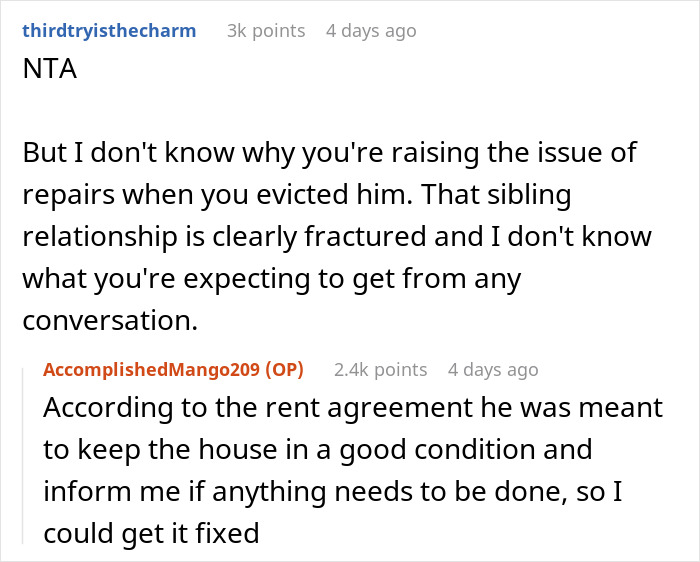
Most readers supported the woman’s decision to evict her brother. Here’s their take on the situation




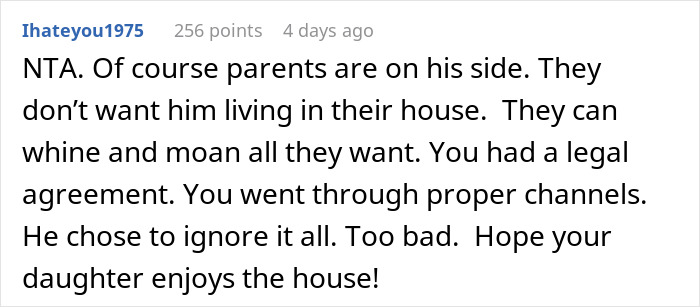
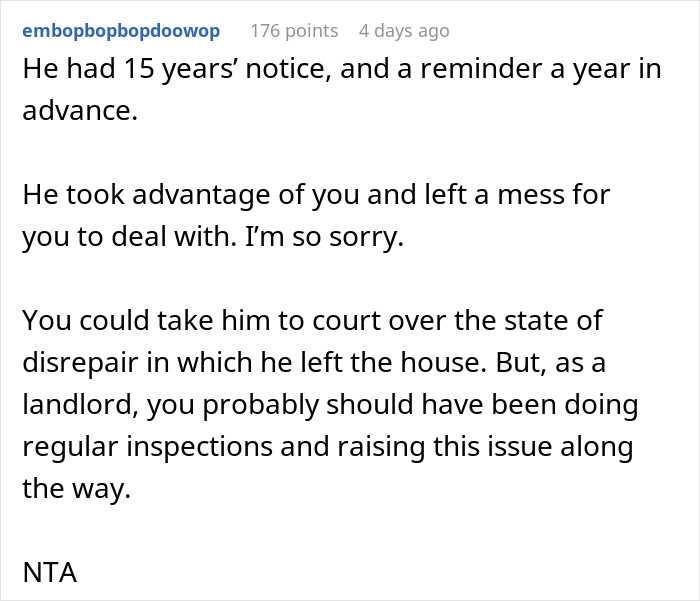


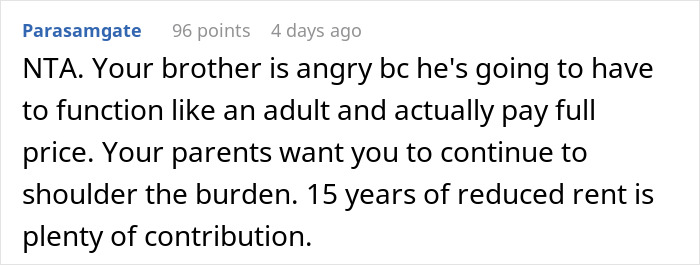
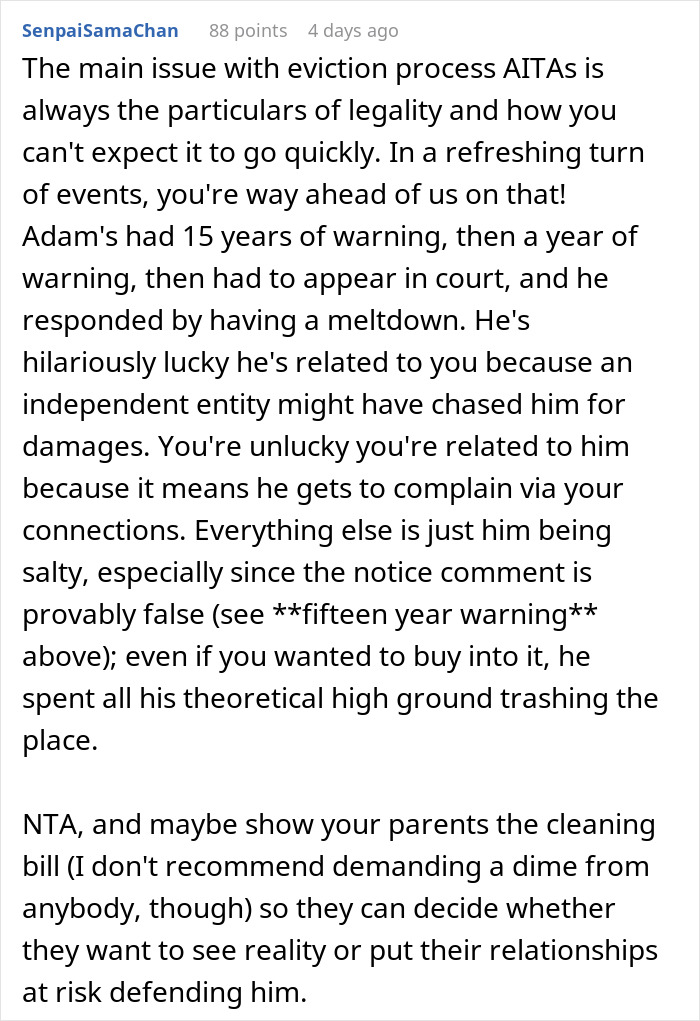

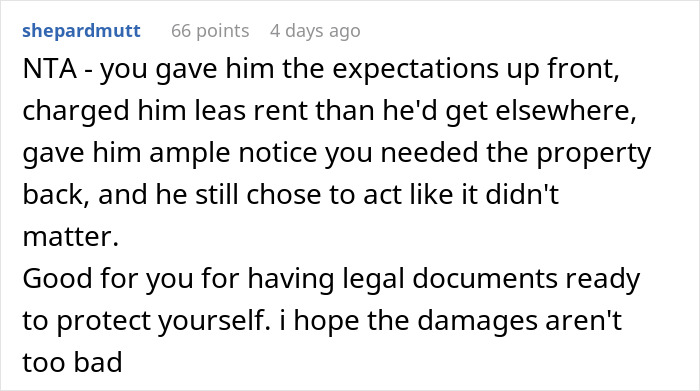
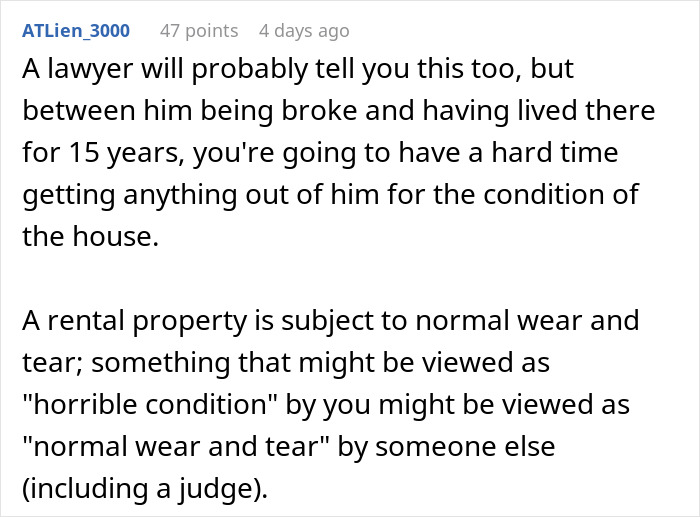






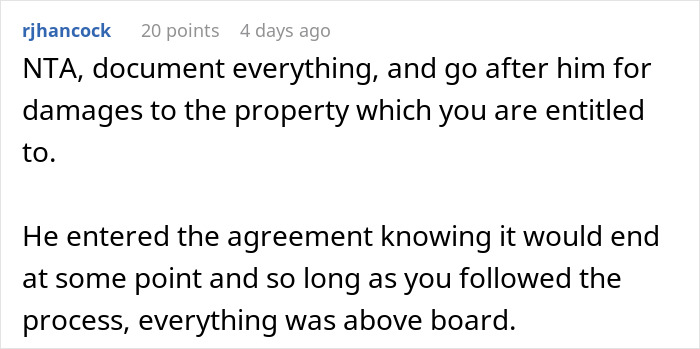
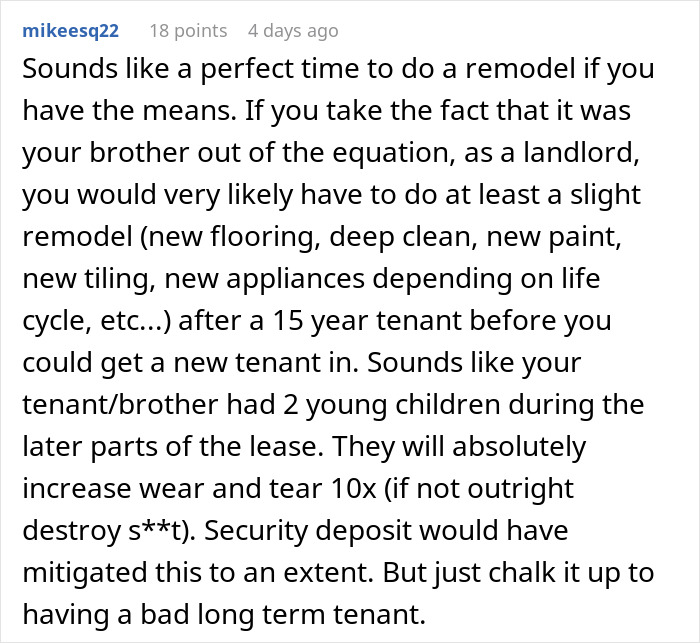
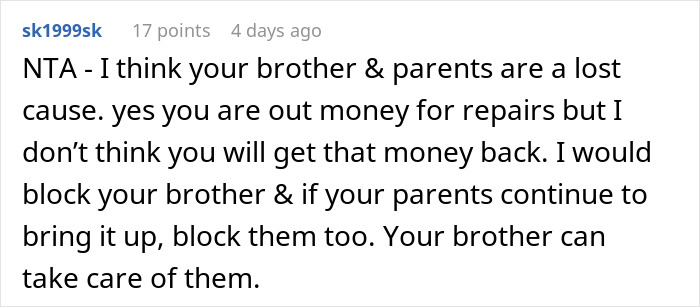


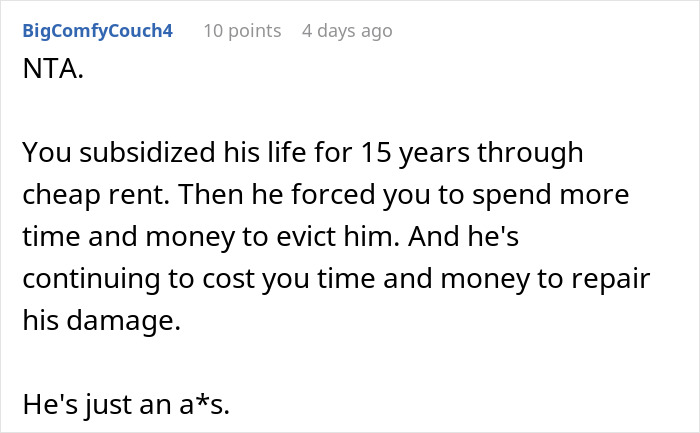












 English (US) ·
English (US) ·